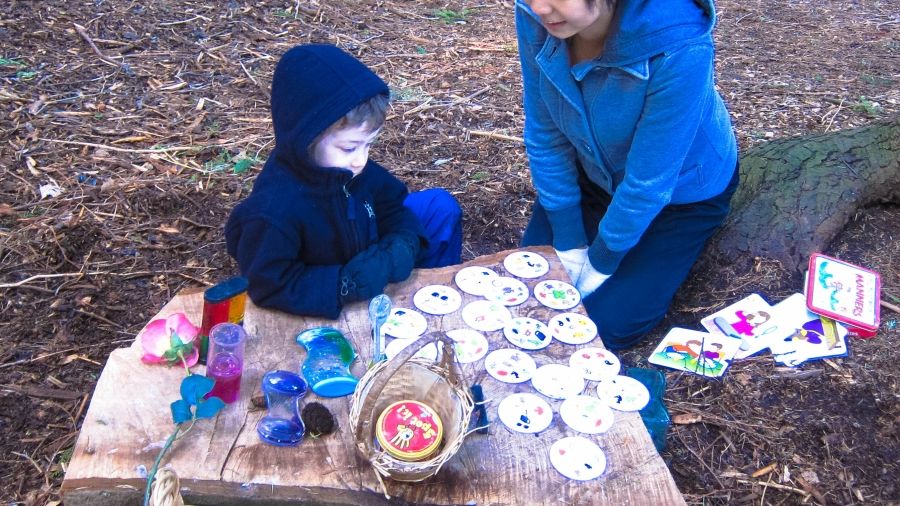
Twenty years old, and I was still afraid of getting dirty. These kids had not yet turned five, and they had no inhibitions... just rolling around in dirt, climbing nurse logs, and eating licorice ferns. I would never have done any of these things had it not been for the kids showing me the way. I never imagined it would be possible to have a school outside, all year round.
- Angela Feng, Forest School Intern
Angela Feng, now a senior at the University of Washington, interned with Fiddleheads Forest School in early 2014. The kids changed Angela’s world and she changed theirs by bringing music to the forest classroom. Armed with her ukulele and a bin of forest school instruments, she inspired rhythm and song writing during the cold, rainy winter months.
Fiddleheads Forest School has hosted nine interns since we opened our doors two years ago. Some internships last one quarter, others the entire school year. Fiddleheads is unique because it is a forest school within the University of Washington Botanic Gardens. Our program’s connection to the University of Washington has enabled us to foster a distinctive internship program, attracting dedicated and passionate interns.
The Value of Interns as Assistant Teachers
Interns at Fiddleheads are our assistant teachers. They learn to contribute at circle time, lead kids on exploratory adventures through the Arboretum, write and teach the kids songs, prepare and facilitate art projects and science experiments, and develop assessment tools for the children. These aspiring teachers bring a wonderful mix of creativity and inspiration. Parents are particularly thankful for our internship program as they appreciate the added security and availability of teachers as additional hands and eyes. (Note: Parents frequently ask if we run background checks on all interns, and the answer is yes, we do.)
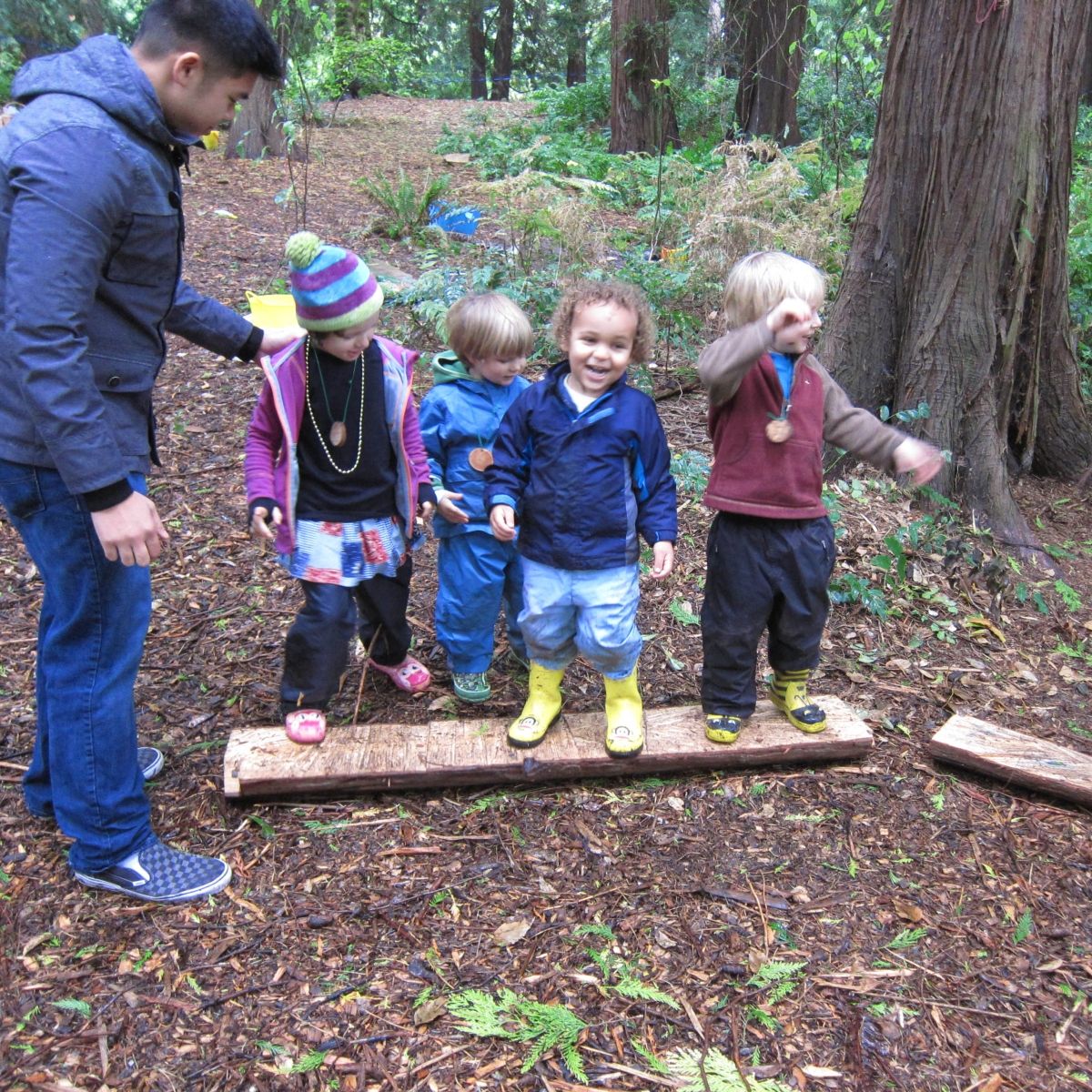
Fiddleheads Forest School
Interns help us to reflect upon and grow our program through daily debriefs. During clean up time and beyond, our teachers and interns discuss the day, reviewing key activities, discussing interactions of note, asking questions about what they saw, and making note of specific interests or questions the kids had. These daily discussions keep us focused on asking how are we are doing as educators, and what could we be doing better.
Interns often bring their assignments into the classroom, driving new activities and explorations. A recent intern, Jackie, wanted to learn about assessing the development of children. She created a rubric specific to Fiddleheads to evaluate children on a development scale, and used her rubric on a single child and made recommendations on how we could foster the child’s development in specific areas.
Often interns will have their own creative inspiration. Last year, two of our interns got together and wrote a song about the forest school and performed it on their ukuleles for the kids. The two interns were both musicians and they used their song to share their enthusiasm for music with the kids. The kids’ interest in the ukuleles led to the interns to teach the kids how to hold and play the ukulele.
Beyond the direct value to our school, our internship program is our chance to impart the value of nature-based learning on the future generation of teachers. Our interns come from a wide variety of programs, often with little to no experience in outdoor settings. Our program is an exciting opportunity for these students to directly experience the ins and outs of nature-based preschool education. Interns often recount that their peers in their degree programs are shocked by our interns’ stories of their days jumping in puddles, watching a slug crawl across their arm, or experiencing the joy a child had seeing an owl for the first time. We know that not all teachers are cut out to be full-time outdoor educators, but we hope these experiences inspire these rising teachers to appreciate and take advantage of the outdoors in whatever ways they can.
Our Internship Opportunity
After a lifetime of confined and structured classrooms, I was utterly and completely stunned by the outdoor model that Fiddleheads provided...I saw students explore, discover, learn, and play in an environment ripe with learning opportunities. Whether we were telling stories on the nurse log, observing baby owls, or examining frozen ponds, Fiddleheads found opportunities for growth in every circumstance. The students took their education into their own hands. At Fiddleheads, I was graced with lessons in compassion, leadership, and the importance of play within a classroom. As I make the transition into a teacher career, I’ve learned to place a great emphasis in student engagement.
- Minh Tran, Forest School Intern
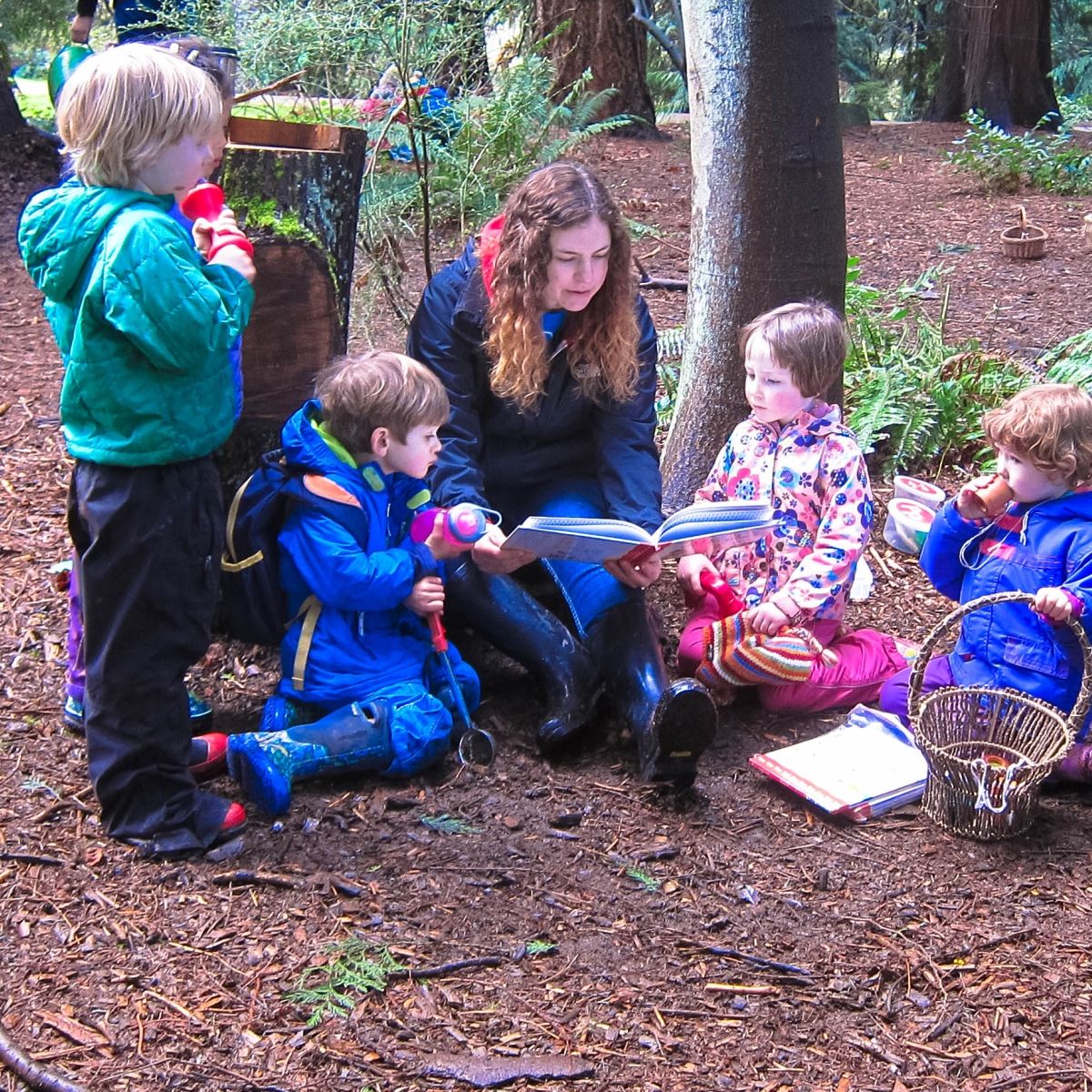
Fiddleheads Forest School
Beyond the value to Fiddleheads Forest School, internships are a wonderful opportunity for aspiring teachers to gain experience in our outdoor classroom. Forest schools, and ours in particular, provide a unique opportunity for teachers-in-training to experience something entirely different than what they are studying in school. At Fiddleheads, we provide an opportunity to further develop skills in teaching and engaging children outdoors. We create a supportive environment where an intern can try singing a song at circle, reading a story to a group of children, facilitating an art project, or leading a new game, all within the context of the natural world. We also train interns on how to use our foundational social and emotional curriculum, in addition to our conflict-resolution curriculum. These opportunities enable our interns to build confidence and gain experience in outdoor education; early childhood behavior; and physical, emotional and social development.
Reflection is a cornerstone of the internship program at Fiddleheads. As John Dewey wrote, “We do not learn from experience … we learn from reflecting on experience.” Each week we reflect by collectively sharing stories from the week: moments of success, challenges, funny highlights, developmental notes on individual children, and opportunities for improvement. Teachers and interns will ask questions of each other in reflecting on what each could have done differently, or ideas to try next time. Often the teachers will guide and facilitate the reflection to help interns make experiences a tool to draw on in the future. Reflection time is what pushes us (both teachers and interns) to become better educators, to continually refine our practice, challenge our philosophy and strive to better support the children.
Interns receive support from staff and access to resources including experts and professionals in the field, curriculum guides, reference books, and one-on-one time with the lead teachers to reflect and debrief. In addition to our daily and weekly reflections, we schedule, depending on the internship length, monthly or quarterly meetings where we talk more in depth about each intern’s experience. We use this time to reflect on the bigger picture, and discuss ideas pertaining to their goals, coursework, and careers.
If the interns were to take away two things from an internship at Fiddleheads Forest School, we hope they are inspired to take their future students outside and that they practice life-long reflection as a teacher.
How to Set Up an Internship Program
If you think your school might benefit from an internship program—and you have the time to invest in mentoring future teachers—here are a few tips and tricks from our experience setting up an internship program.
Get the Word Out
-
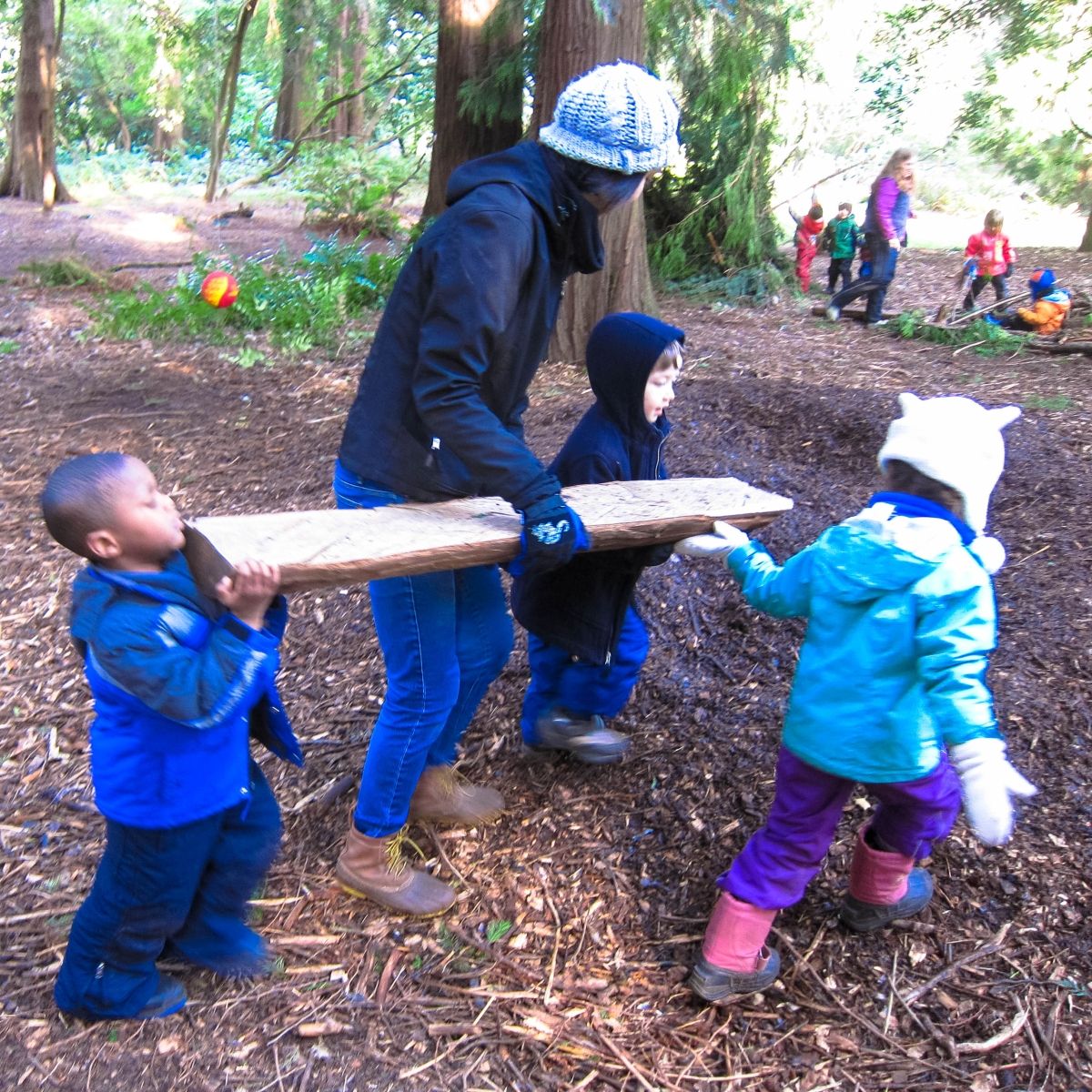
Fiddleheads Forest School
Reach out to professors and student advisors at your local universities and colleges. Ask about service-learning and internship requirements, volunteer hours, and service projects in classes. Information about what the college or university requires will enable you to develop an internship program that aligns with the needs of the students.
- Write a compelling position description that outlines your expectations as well as how an intern will benefit from working with your school.
- Research opportunities for developing a stipend to pay interns. This is not necessary, but definitely a way to attract a wider variety of applicants since not all students have the ability to intern for free while in school.
- Advertise the internship position. Send it to professors and student advisors to distribute, hang flyers on campus, and post to craigslist or other local online job sites.
Set Your Program up for Success
-
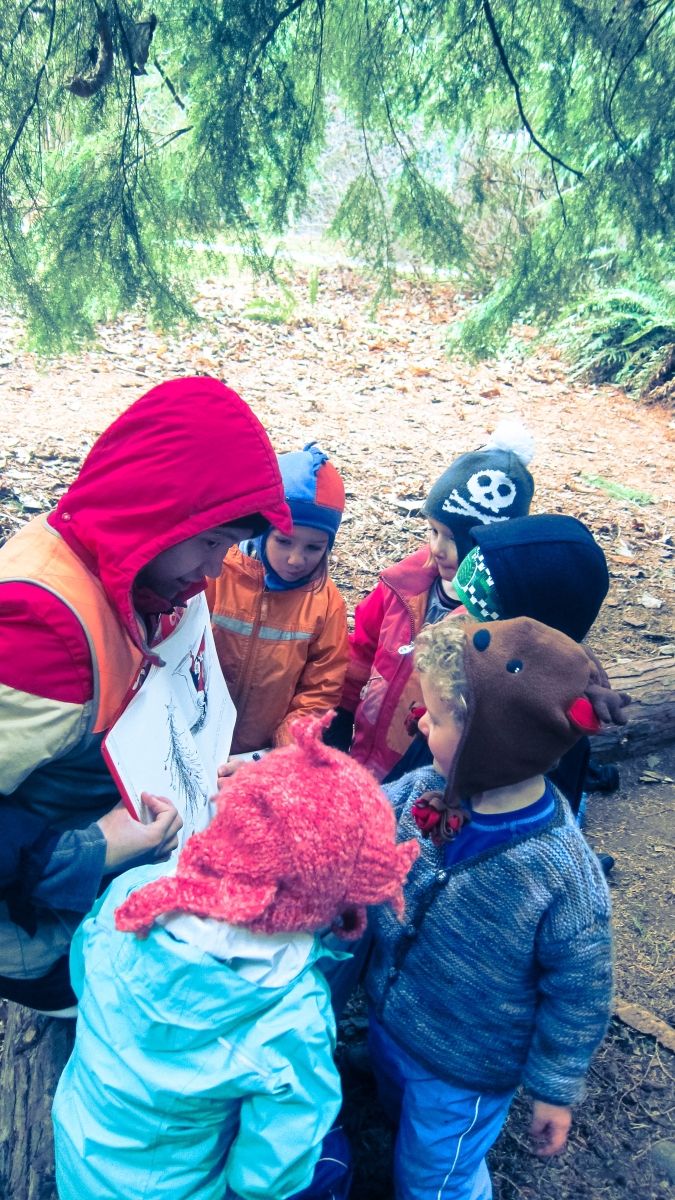
Fiddleheads Forest School
Create an intern handbook. This should outline policies and procedures pertaining to risk, liability, and safety and emergency protocols. The handbook is also an opportunity to clearly outline your expectations for the interns. It is helpful to include the school’s philosophies on interacting with kids, facilitating learning, and behavior management. At the end, include tips and tricks for setting boundaries and how to support the lead teachers.
- After “hiring” your interns, make sure to run background checks before they begin the internship. This will ensure safety and liability for the school, as well as mitigate parents’ concerns.
- Train your interns. Set up at least one in-office training session where you can introduce the intern to your school, talk through your philosophy, show them the space, and discuss expectations and responsibilities. Make sure their first several experiences with kids entail observing classes and shadowing teachers.
- Have regular check-ins. Meet regularly with your intern outside of class time to make sure the internship is meeting his or her expectations. These regular check ins also give the teachers an opportunity to provide feedback or suggestions to support the growth of the intern, and insure they are delivering a quality experience for the children.
- Perform an exit interview upon internship completion. This is a great opportunity for interns to provide feedback on their experience and improve the internship program.
… one of the kids bumped heads with another. He immediately started to cry, and I sat with him to make sure he was all right. After a few moments, he began to quiet down. He started listening to his surroundings, and whispered to me, ‘Do you hear it?’ ‘Hear what?’ I whispered back. ‘Nothing. Everything's so quiet.’ We sat together for a long time, surrounded by the trees, the sky, and the silence. It was one of the few times in my life in which I truly felt at peace with the world. I think he felt the same way.
– Angela Feng, Forest School Intern
Resources for Learning More
- Fiddleheads Forest School’s internship position description and school website
- Teacher training workshop at Fiddleheads Forest School
About the Author
Sarah Heller has worked at the University of Washington Botanic Gardens for four years and as an environmental educator for eight years. Sarah, along with her co-director Kit Harrington, opened Fiddleheads Forest School in 2013 fulfilling their dream of having a nature based preschool in the Washington Park Arboretum. Sarah and Kit have hosted nine interns since opening Fiddleheads and continue to develop their teacher training program. If you have questions about starting an internship program, you can contact Sarah at [email protected].